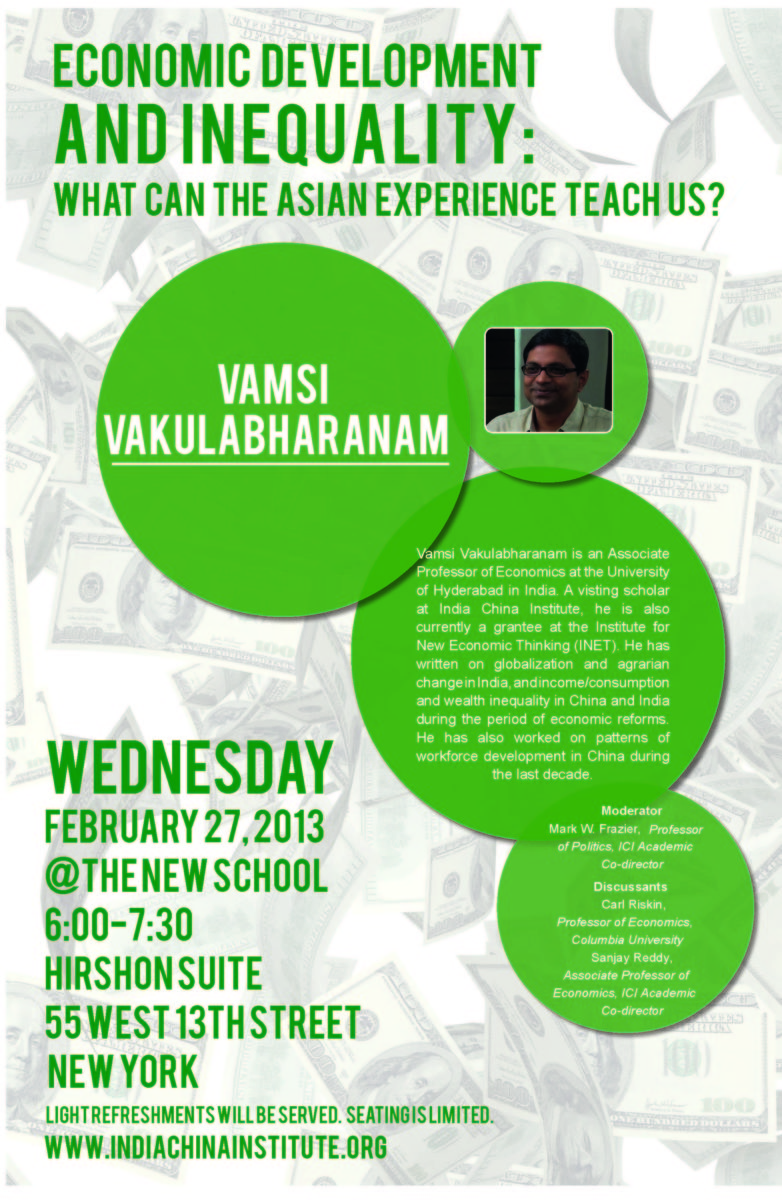
Economic Development and Inequality: What Can the Asian Experience Teach Us?
February 27, 2013 , 6:00 pm – 7:30 pm

A lecture by Vamsi VakulabharanamSchool of Economics, University of Hyderabad, India
Moderated by Mark Frazier, Professor of Politics, NSSR, and ICI Academic Co-director
Discussants: Carl Riskin, Professor of Economics, Columbia University
and Sanjay Reddy, Professor of Economics, NSSR, and ICI Academic Co-director
Development and Inequality: What can the Asian Experience Teach Us?
The Asian experience of growth from the 1950s until now has had some of the most profound transformational effects on the global economy. The well-known East Asian Miracle, and the closely following miracles of China and India have had dramatic effects on the structures of global production as well as on global measures of poverty and inequality. Perhaps less explored are the very divergent natures of their take-offs. In the first wave of Asian growth, some Asian economies (such as Japan and the ‘Tiger’ economies) experienced a relatively equal early capitalist growth/development process between 1950s and 1980. Subsequent growth however became much more unequal. In the second wave of growth in countries such as China and India, early capitalist growth/development since 1980 is associated with a sharp increase in inequality. How might one understand these different phenomena, given that there is no clear standard economic theory that provides an explanation? In this paper, I propose an explanation that draws from local political and economic structures of these economies and the deeper changes in global economy since 1980s. I seek to re-incorporate political economy insights to obtain a more holistic understanding of Asian growth and its effects on the global economy. In analyzing Asian economies, the shift in regimes of global and local capitalisms, and the implications for a deeper understanding of the relation between development and inequality are brought into sharp focus.
About Vamsi Vakulabharanam
Vamsi Vakulabharanam is an Associate Professor of Economics at the University of Hyderabad in India. He is currently a grantee at the Institute for New Economic Thinking (INET) working on a project titled, ‘Economic Development and Inequality: What Can the Asian Experience Teach Us?’ He was also a Fellow of the India China Institute of the New School between 2008 and 2010. He obtained his Ph.D. in Economics from the University of Massachusetts Amherst in 2004. He taught at the City University of New York between 2004 and 2008. He has focused his research on inequality in contemporary Asian economies including, India and China. He has written on globalization and agrarian change in India, and income/consumption and wealth inequality in China and India during the period of economic reforms. He has also worked on patterns of workforce development in China during the last decade. He has published his work in academic journals, including World Development, Development and Change, Journal of Peasant Studies, Journal of Development Studies, Review of Radical Political Economics, Economic and Political Weekly, and Ethics and Economics, and has chapters in multiple books.
